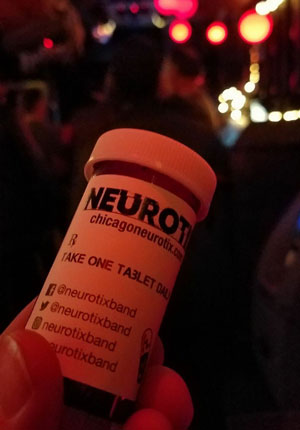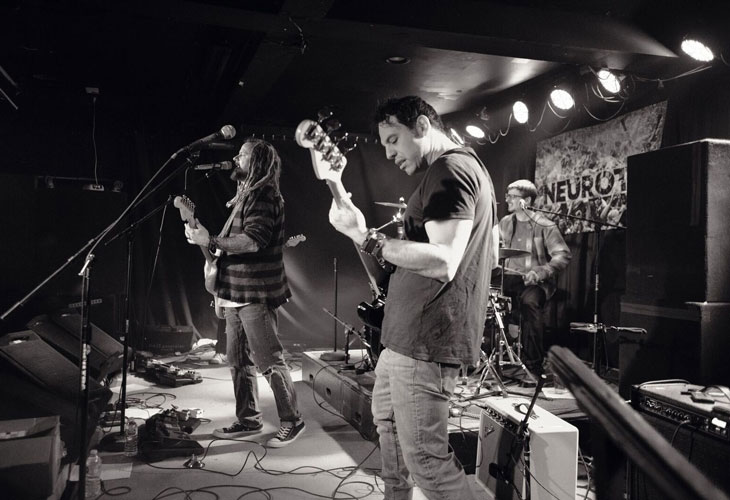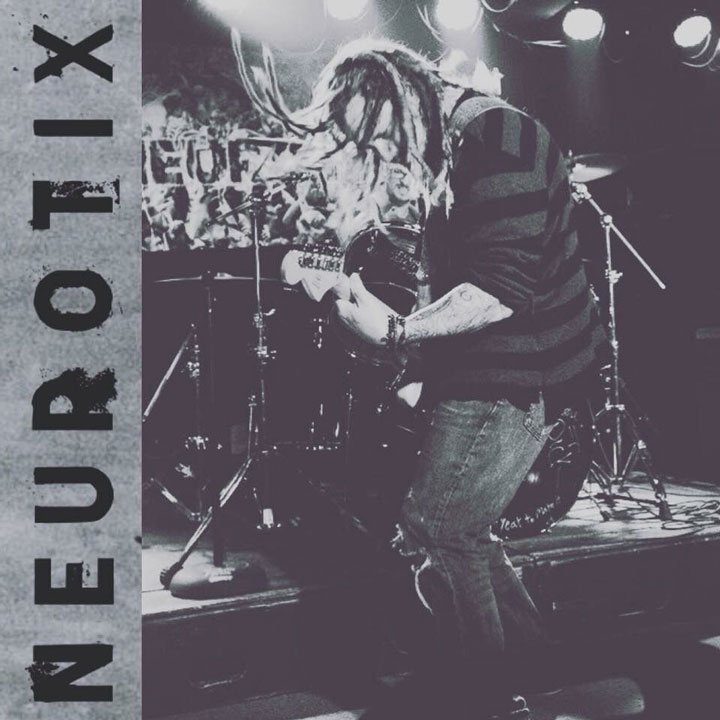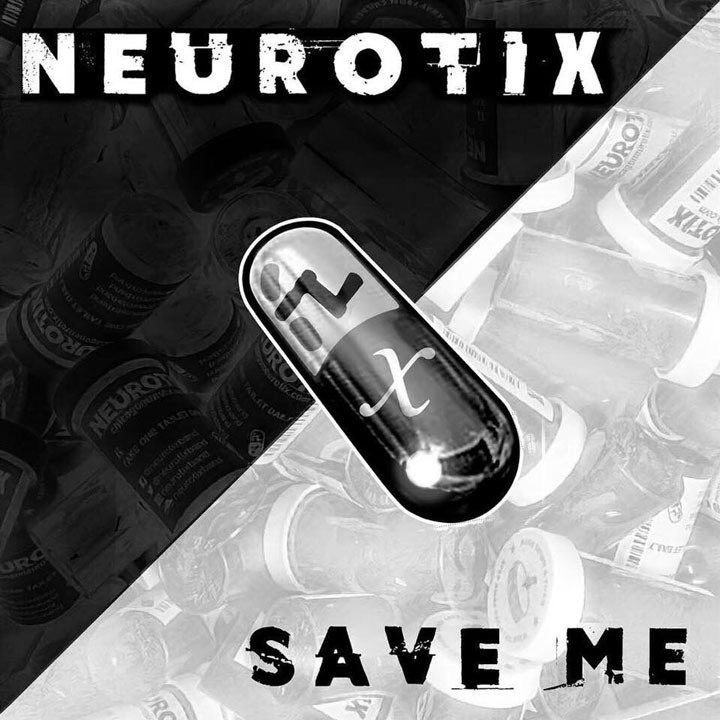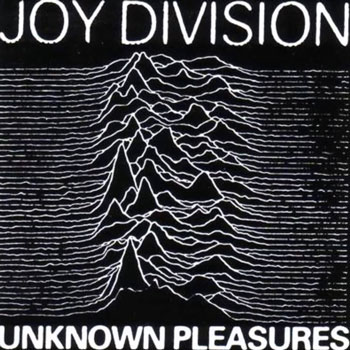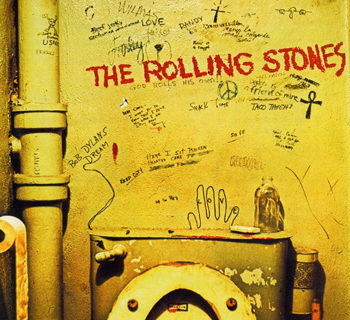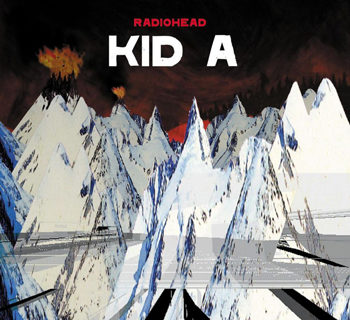Chicago's Neurotix Turns Rage into Love
"Sometimes a good drum dive is exactly what the moment calls for," Neurotix frontman Dom Tonozzi tells me over the phone. "It doesn't always work, but if the energy is right, a good drum dive is fucking perfect."
A few days ago, Tonozzi and Neurotix had played one of their local Chicago venues. The sound guy cut Tonozzi's mic off when the band went over their scheduled time. In response, Tonozzi grabbed a megaphone and tried singing through it while the rest of the band shredded on.
When the megaphone failed to function, Tonozzi pursued the only rational course of action left to him—he dove headlong into bandmate Dave Reisig's drum set.
"I don't suggest trying it, because it's pretty dangerous," Tonozzi tells me. "At the end of the day I'm happy I did it, because I got to show the fans a complete climax explosion, and everyone there felt and loved it as much as I did."
The story is a perfect summation of everything Neurotix stands for. They're here to resurrect grunge. Not just the genre's stylings, but also the reckless passion and ragged joy of it all. More than that, they're here to contribute in their own little way to make the world a better place.
"Most modern music sucks," Tonozzi says. "It's too clean."
Grunge saved Tonozzi's life when he was a young man living through the genre's heyday. It allowed him to vent his anger and frustration. It grounded his confusion. If not for the catharsis of the music, he says, he may have destroyed himself.
Now a husband and father who built a successful restoration business from the ground up, years away from those younger days, Tonozzi wants to give that gift back.
In response to the recent spate of school shootings, Neurotix posted the message, "Grunge not guns." It wasn't meant to be cutesy. Tonozzi stands by his conviction that real, raw music can save lives, in more ways than one.
A few good drum dives along the way can't hurt, either.
Neurotix Grunge: The Cure for What Ails Ya
Tonozzi talks the way Neurotix plays; fast and furious. He gets onto a topic and follows it wherever it may go, verbally exploring every intellectual side street with total abandon. He's a friendly, optimistic guy, which may contrast with what one might expect from a guy that specializes in a genre synonymous with angst and depression.
"To me, grunge is about facing and releasing raw emotional truth," Tonozzi tells me. "It's a great tool to recognize and cope with darkness and terrible situations in a fallen world and come out okay. Grunge is all about release and moving on from the fuzz or distorted guitar, matching your inner most feelings and composing it to the world at a heartbeat of 160 BPMs. This is a way healthier alternative to pharmaceutical drugs to just mask and cover feelings."
This pharmaceutical theme pops up frequently in talking with Tonozzi. He's passionate about grunge being a healthier medication than drugs, but he's no fanatic or fool about it.
"Some people need that stuff," he says. "I'm not saying they don't. But I think there's way too many people that are being on it that don't need it."
It's an interesting item for a modern grunge band to fixate on. Back in the '90s when grunge ruled popular culture, the medication of teenagers was just become a hot topic. Nirvana named one of their most iconic songs after the medication lithium. Over the intervening years, as pharmaceuticals have become more and more ubiquitous, they've also become more controversial. The topic's been a raw nerve for a couple decades now.
Tonozzi isn't so much interested in bashing pharmaceutical companies as he is in celebrating what he considers an alternative. In describing the message he's trying to get across, he says, "Spit it all up. Release your rage. Acknowledge your faults. Let go. It's OK to not be OK. Light always conquers darkness. We are all equal."
Luckily for Tonozzi, he found fast allies in his grunge crusade. Back in 2016, when he first decided to form a band, he went to the aforementioned drummer Reisig. They'd met a year earlier while Tonozzi shopped for drum lessons for his son.
Reisig brought along bassist Carlo Tamayo. Guitarist Paul Rhyne rounded out the act shortly after, responding to Tonozzi's online ad. From there, Neurotix was born.
"Our story is one that almost seems like fate," the band writes on their website.
It's refreshingly heady stuff in this modern era, where songs are expected to stick around less than 24 hours and then politely disappear, while artists are supposed to understand beforehand that no one really takes them seriously, anyway.
It's refreshingly heady stuff in this modern era, where songs are expected to stick around less than 24 hours and then politely disappear, while artists are supposed to understand beforehand that no one really takes them seriously, anyway.
In a lot of ways, 2018 isn't all that different from 1991, the year that Nirvana's Nevermind took a wrecking ball to everything. Before that, popular music had verged into self-parody, the 1980s were characterized by excess and materialistic vapidity, and nobody was selling out because everyone had already bought in. They bragged about being the punchline.
That's when grunge came in.
While everyone was busy dancing to Vanilla Ice and Michael Bolton, grunge slinked in through a window, plugged a guitar into an amp, and promptly blew the whole fucking house away.
Real Deal Holyfield
Some people say that Neurotix sounds too much like Nirvana.
"No shit," Tonozzi says in response to that. "Kurt died over 20 years ago, man. We’re bringing back what we consider to be an unfinished genre."
This unabashed emulation of Nirvana is more overt in some songs in others. I don't hear it as much in songs like "Pumpkin Seeds" (which happens to be my favorite Neurotix tune). At other times, it is unabashed and obvious. "Vulnerable" and "Girl on the Street," for instance, wouldn't sound of place in a collection of Bleach outtakes. That doesn't change the fact that they rock.
One of Neurotix's most recent songs (and possibly their most popular) is titled, appropriately enough for a '90s-throwback band, "Loser." Like any true, red-blooded grunge song, the lyrics are sung so frenetically that they're almost impossible to understand. Thankfully, Tonnozi wrote them out for me.
"I don't want to work I don't want to think
I don't want to say anymore things
I give up I did my best
Not good enough to her defense
I can't sustain the illusions in my head
They won't stop it they never rest
I lost my girl I sold my friends
My shitty hand never ends
Call me a loser entertain me
Cut me down you disgrace me
Throw me out just don't waste me
When I'm gone just erase me"
Those lyrics could have been ripped straight out of a time capsule buried in 1993. That's the point, though.
Grunge became a cultural phenomenon for a good reason. The term itself might have been marketing garbage that the "grunge" bands themselves rejected, but that doesn't change the fact that its impact, and the reasons for that impact, were meaningful and real.
The thing is, grunge was never really a sound. Even in the genre's heyday, no one could decide how the hell to define it. To this day you can set off a fist fight by saying in certain circles that Pearl Jam was a grunge band. Simultaneously, there's millions of people who think of Pearl Jam as the very embodiment of grunge.
In the end, "grunge" is just a word. It's not a particular sound or style. What marked bands as grunge was their spirit and attitude. More than anything, grunge was, and is, about authenticity. And, what I can say with absolute certainly after talking to Dom Tonozzi for almost two hours is that the man is definitely authentic.
Everyone has their own pet theories for why the grunge era was what it was. I don't know which ones are right or wrong. What I do know is that, for whatever reason, it was a time when young people were desperate for something real and sincere. It was a whole generation of Holden Caulfields trying to figure out what the hell to do with their lives in a world where everything and everyone seemed to phony.
For whatever reason, for '90s kids, parents were fake. Media was fake. Heroes were fake. Materialism and society were fake. It was all just a steaming pile of horseshit, and the kids wanted something real. Laughter, tears, rage…just something real.
They wanted someone to speak the truth, and they wanted to speak their own truth. In the world of veneers and pretend smiles that they either rightfully or wrongfully saw around them, they reacted by wearing ratty clothes and moshing to semi-harmonious fuzz and screams.
In the world of veneers and pretend smiles that they either rightfully or wrongfully saw around them, they reacted by wearing ratty clothes and moshing to semi-harmonious fuzz and screams.
Hell, half the time the music sounded like shit, and they knew it. They just didn’t care. What they wanted was something real and authentic.
Nothing ever really changes that much. There's nothing new under the sun. It may be 2018, not 1991, but there's still plenty of kids, adults, geezers, hungering for something real and raw. Tonozzi and Neurotix just might fit that bill.
They're on a mission to put some ugly back into music and to help listeners rage their way to love and inner peace. It's a noble mission. It's an ambitious mission. But, the band is good enough that they just might pull it off.
And if they sound a bit like Nirvana along the way? Well, surely there's worse crimes than that.


